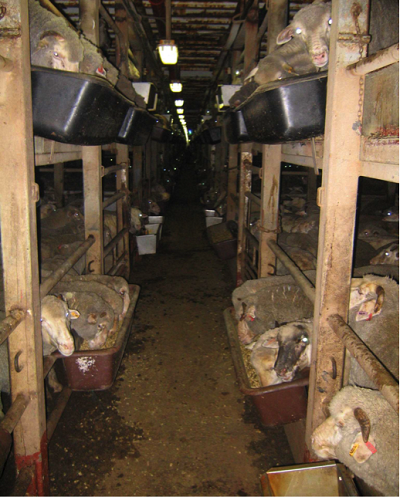South Africa's NSPCA Condemns Al Shuwaikh Voyage
South Africa's National Council of SPCAs (NSPCA) undertook an inspection of the empty livestock carrier Al Shuwaikh at the request of the South African Government last week and found the vessel to be “unsuitable to transport 61,000 sheep.”
The livestock carrier drew public attention earlier this month when local TV show Carte Blanche investigated the vessel's imminent arrival and the nation's emerging live export trade with Kuwait.
The NSPCA says its inspection confirmed that there is cause for major welfare concerns and unavoidable contraventions of the Animals Protection Act No 71 of 1962 and OIE (the World Organisation of Animal Health of which South Africa is a member) minimum standards.
The NSPCA inspectors were at first denied access on to the vessel and were required to enforce their warrant, with the assistance of South African Police, to access the ship.
NSPCA inspectors were also initially denied access to the feed lot where the sheep are currently being held in spite of being in possession of a warrant. After finally gaining entry with the intervention of the Police, the inspectors had to euthanase a sheep due to it reportedly having a fractured leg. There were other animals that were limping and that had eye infections.
According to the NSPCA, a statement issued by Kuwaiti importer Al Mawashi said that the voyage would only be 16 days, but this does not include the days spent in the South African port during loading and three Middle Eastern ports for offloading. From Australian Government reports, the Al Shuwaikh spends on average two days at each port in hot conditions.
Twin-tiered vessels, such as the Al Shuwaikh, will not be permitted to load livestock in Australia from January 2020. (The image below shows a twin-tier arrangement.)

A recent onboard observer’s summary of conditions on board the Al Shuwaikh as she sailed from Fremantle, Australia, to Kuwait revealed that for eight days sheep were open mouth breathing, indicating severe heat stress, as they “attempted to gain position around the ventilation vents on all open and closed decks.” Multiple instances of “death by smothering” occurred as a result. Heat stress was worsened by “oil fuel heaters being left on during the equator crossing” and poor ship design with “dark colored steel roof surface absorbing radiated heat from above.”
NSPCA says the route from South Africa to the Middle East will cross the Arabian Sea and enter the Strait of Hormuz. “These areas are confirmed high risk areas for heat stress during the period of May to October. The high temperatures in this area, which remain persistently high without relief (even overnight), render sheep incapable of regulating their body temperatures. Evidence has shown that during voyages between May to October, the combined heat and humidity can reach catastrophic levels causing heat stroke, resulting in sheep 'cooking alive.'”
Heat is not the only concern. Animals may further be compromised by:
• Lack of appetite leading to exhaustion;
• Salmonellosis;
• High stocking density, which leads not only to physical discomfort and an inability to rest, but also to food and water restrictions;
• Pneumonia from multifactorial causes;
• Motion sickness;
• Change in lighting period and photoperiod resulting in stress and an impaired immune system;
• Physical trauma and injuries (trampling and injuries caused by rough seas).
More than 100,000 liters of urine and feces accumulate on a typical live export ship every day sheep are on board, says NSPCA. The weeks of untreated waste build-up mixed with high temperatures can create a slurry of excrement making it dangerous for animals to lie down as they risk being buried alive. The ammonia from the excrement poisons the air, burns the eyes and throats of those on board, and often leads to respiratory infections.

that matters most
Get the latest maritime news delivered to your inbox daily.
“Many animals will not survive the journey, the cumulative deaths on the fleets of Al Mawashi for the period from 1980 to the first half of 2017 is more than 1.5 million deaths,” says Senior Inspector Grace De Lange, manager of the NSPCAs Farm Animal Protection Unit. “Those that survive the voyage will then face the horrors of arriving in a country where there are no animal protection laws. They will be shoved into boots of cars, and handled inhumanely – and they will be slaughtered fully conscious, often by unskilled slaughterers, and in the presence of other animals.”
The NSPCA believes that live export by sea for the purposes of slaughter is completely unacceptable and unnecessary. “If the Government allow this shipment to go – they would do so in full knowledge that animals will suffer unnecessarily. The responsibility therefore lies with the Government to prevent this cruelty from occurring by upholding the law of South Africa.”
